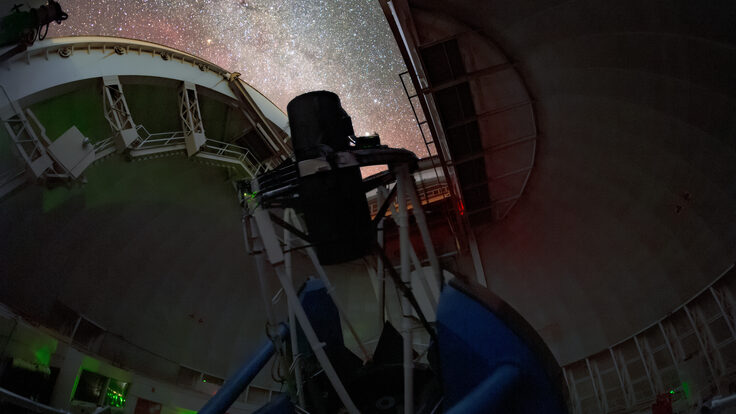Mike Lazaridis, who made a fortune developing the BlackBerry handheld device, is donating another $50 million to the Perimeter Institute for Theoretical Physics in Canada. That's on top of the $100 million in personal funds he put up to found the institute in 2000. The gift will allow Perimeter to continue its current rate of expansion without drawing down its endowment. The donation was announced this evening to a crowd gathered for a public lecture at a high school near the institute.
"At Perimeter we don't do any experiments," Lazaridis said by phone from the institute. "So our costs are basically room and board, chalk, a computer system and access to libraries, and a travel budget for conferences and collaborations. What's happened is that Perimeter has become well-recognized globally, and we have a lot more people desiring to come here and work and collaborate with our staff, so we've had to accelerate our expansion plans."
This is the third major donation to physics research, and by far the largest, in the past six months. Just 12 days ago, Fermi National Accelerator Laboratory announced that a $5 million donation from an anonymous family, channeled through the University of Chicago, combined with other factors would allow it to end a rolling furlough program that forced employees to take unpaid time off and forego 12.5 percent of their salaries. And in January, the Large Synoptic Survey Telescope Project disclosed gifts (PDF) of $20 million from the Charles Simony Fund for Arts and Sciences and $10 million from Microsoft founder Bill Gates. The telescope will survey the sky from a mountain-top in Chile, looking for evidence of dark matter and dark energy.
These are the latest developments in what appears to be a budding tradition of philanthropy in high-energy physics. As we reported in the August 2007 issue of symmetry, private donations also funded the Fine Theoretical Physics Institute at the University of Minnesota and the expanding chain of Kavli institutes. Two years ago, a $13 million donation kept the Relativistic Heavy Ion Collider at Brookhaven National Laboratory running in the face of severe budget cuts.
At Perimeter the problem was not so much a lack of money as a surge in popularity. In its eight years of existence it has attracted funding from the national and provincial governments, recruited 85 resident scientists--including 10 faculty, 10 associate faculty, 39 postdocs, and 26 graduate students--and contributed more than 800 papers to the peer-reviewed literature, according to spokesman John Matlock.
Lazaridis, who was born in Turkey to Greek parents and moved to Canada with his family at the age of five, dropped out of the University of Waterloo just shy of a degree in electrical engineering to launch Research in Motion, maker of the ubiquitous BlackBerry device. He is now chancellor of the University and a benefactor as well; he and his wife have donated $50.5 million for the university's Institute for Quantum Computing, including funds for a building the Institute will share with a nanotechnology engineering program. The Toronto-based Globe and Mail has a profile of him here.
He said that when he considered how to give back to his society, supporting theoretical physics was a natural choice.
"Obviously this is very, very important, and it's an area I have a passion for, a natural affinity for," he told me. Throughout history, new ideas, from Maxwell's unification of electricity and magnetism to Einstein's insights into space, time, and light, have led to revolutions in industry and the creation of wealth. "Everything from power generation to transmission over power lines, induction motors, which led to the invention of the radio, which led to the invention of communications,'' Lazaridis said, rapid-fire. Einstein's idea that energy comes in discrete packets, called quanta, figures into semiconductors, lasers, fiber optics, and the Internet.
"All these things have led to major changes in our society and our industry," Lazaridis said. "When you sit back and think there's so much more to discover--anything from quantum gravity to string theory, the confirmation of the Higgs boson--you realize any one of these could lead to massive new industries and new technologies."
Also this evening, Canada's Natural Sciences and Engineering Research Council announced that Perimeter has won the nation's top award for the promotion of science. The institute is awaiting the arrival of a new director, Neil Turok, in October. In an interview last month, he told me he would like to create a graduate-level program at the institute and expand its program for visiting scientists. Turok also plans to continue work on a project he founded that is building research institutes in Africa, with the goal of training brilliant young scientists and nurturing an African Einstein.







